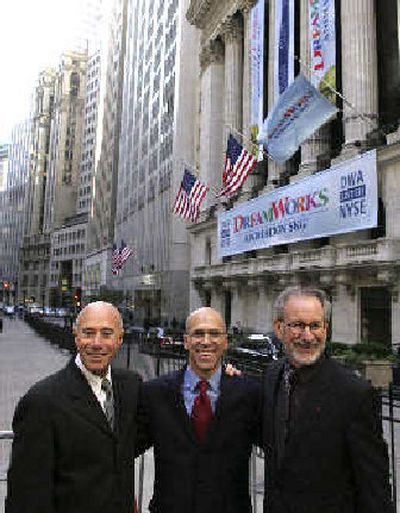DreamWorks faces reality

LOS ANGELES — Steven Spielberg, Jeffrey Katzenberg and David Geffen tried to harness their collective star power in 1994 to do what hadn’t been done in more than 70 years — start a Hollywood studio from scratch.
They called it DreamWorks SKG, the letters standing for the last names of the founders.
Sunday, DreamWorks ended its 11-year run as an independent company by agreeing to be sold to Paramount Pictures, a unit of Viacom Inc., in a deal valued at $1.6 billion.
The sale highlights the enormous, perhaps insurmountable, challenges facing an independent company with hopes of competing against massive media conglomerates.
“It’s very hard for anyone to enter the business from the ground up,” said Harold Vogel, author of the book “Entertainment Industry Economics.”
“It’s not the talent of the individuals. They were superb, they had a brilliant idea, they had connections. But the costs of running the business ran much faster than they expected.”
DreamWorks accomplished much in its short life, including winning several Academy Awards, producing a hit TV series and making the most successful animated movie in history.
The company, under Geffen and Spielberg, will continue to make films that will be distributed by Paramount.
DreamWorks Animation SKG, under the leadership of Katzenberg, was spun off into a public company last year and is not included in the Paramount deal, although it will distribute its films through Paramount.
DreamWorks had grand plans to become a major player in music, film, television, video games and the Internet.
But over the years, it scrapped plans to build a high-tech studio lot in Los Angeles, sold DreamWorks Records to Universal Music Group and curtailed its TV production.
“When Steven, Jeffrey and I started the company and had to put an entire infrastructure together from day one, we had hoped to be able to make enough films to rationalize the cost of being our own distributor,” Geffen said Sunday.
“Sadly, we were never able to make enough films to make that economically sound.”
A handful of independent film companies still remain, including the Canadian company Lion’s Gate Films.
Lion’s Gate has been able to build a substantial library of films, in part through acquisitions. An extensive film library from which to sell pictures on DVD and to cable and television is key to producing the kind of cash that can reduce the risks of box office flops.
“Library values are like real estate in Southern California — they generally go up every year,” said David Miller, an analyst at brokerage firm Sanders Morris Harris.
DreamWorks was able to build a library of only 59 live-action film titles. Ownership of the more lucrative animated films was transferred to DreamWorks Animation.